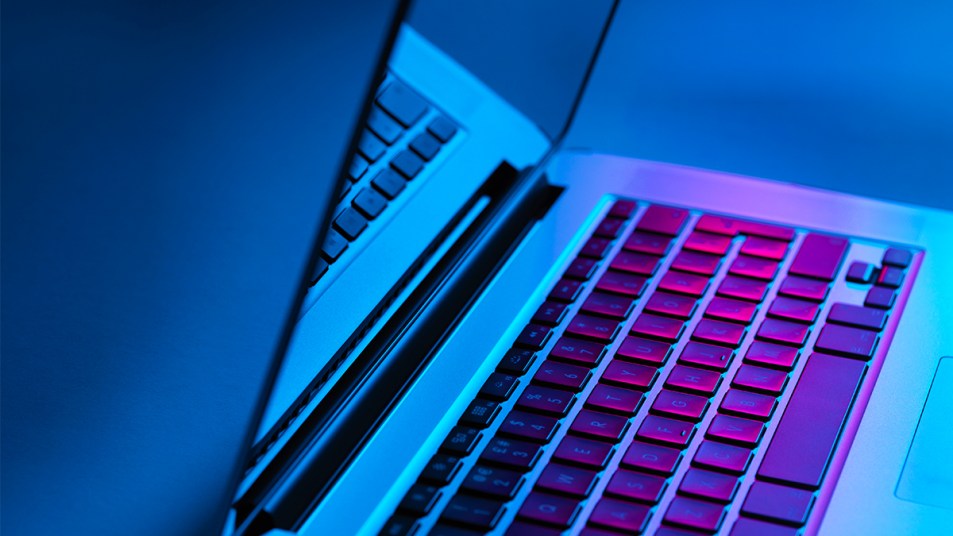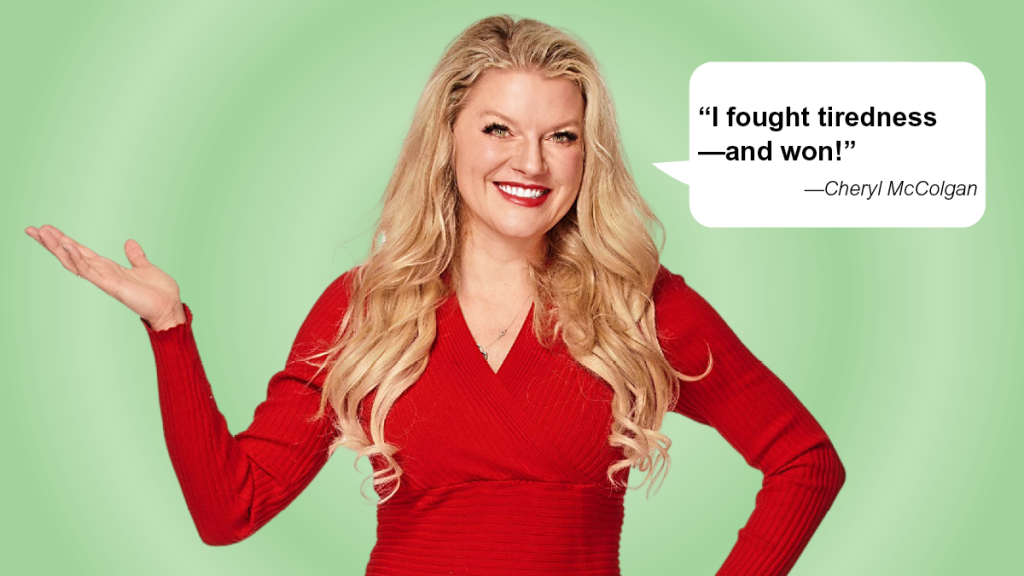Top Docs: Blue Light Emitted By Electronic Devices Is Making Women Tired — 4 Ways to Reduce the Risk
Plus, how one woman overcame blue light-induced tiredness to feel better than ever!

We all revel in the beautiful blue of the sky, the sea and even our loved ones’ eyes. And we’re able to see those radiant hues because of natural blue light. But the blue light emitted by computers, smartphones and other devices has a draining downside. A wealth of research reveals artificial blue light affects sleep to sap next-day energy. Plus, excess blue light can impact the eyes in tiring ways. And while experts warn we’re all vulnerable to blue light’s exhausting effects, you don’t have to ditch modern-day technology to sleep well and feel your best. Keep reading to learn how to outsmart the downsides of our devices, and how Cheryl McColgan did just that to restore her energy and vitality!
What is blue light?
Visible light is composed of tiny particles known as photons that travel in waves of different lengths. And blue light is also referred to as high intensity visible light because its wavelengths are shorter and more energetic than those of red or green light. The high energy of blue light allows it to penetrate deep into the eye, sending signals to the pineal gland in the brain that regulates the body’s sleep-wake cycle. And the natural blue light we get from sunlight helps keep those cycles in sync so we fall asleep easily and wake up feeling refreshed. But blue light is also emitted by a variety of modern-day devices. That’s a problem, since too much blue light can impact the body in a variety of unwelcome ways:
Blue light affects sleep
Overexposure to artificial blue light is draining women, asserts Steven Gundry, MD, author of The Energy Paradox. “For millenia, we lived in sync with sunlight, which contains a variety of light wavelengths that range from blue to red,” he notes. “But today, phones, TVs, computers and LED bulbs emit massive amounts of blue light. Our eyes and nervous systems aren’t designed to handle it, so our circadian rhythms become disrupted.”
Plus, blue light interferes with the sleep hormone melatonin, says sleep specialist Michael Breus, PhD. “When blue light hits melanopsin cells in the eye, they send a signal to the pineal gland that produces melatonin, telling it to turn off the melatonin faucet.” The result: sleep troubles and next-day fatigue.
Blue light impacts vision
According to the American Optometric Association, blue light from sources such as LED lights, computer monitors and tablets can have negative effects on vision over time. Indeed, research in the journal Biomedical Research International reveals prolonged exposure to artificial blue light can impair the function of cells in the eyes that allow us to detect motion, colors and visual details. And as researchers in Investigative Ophthalmology & Visual Science point out, use of blue light-emitting devices has been linked to blurry vision and eyestrain.
Blue light triggers head pain
It’s no secret that spending hours staring at screens can bring on the headaches that are hallmark symptoms of computer vision syndrome (CVS). But according to research in the journal Internal Medicine, the blue light we get from computers, TVs and indoor lighting stimulates photosensitive continental ganglion cells to trigger migraines. In fact, their study suggests high blue light exposures increase migraine frequency and severity by 46%.
Are you exhausted by blue light overexposure?
Studies have identified a variety of symptoms caused by excess blue light. So if you experience the following, overexposure to blue light could be to blame:
- Fatigue
- Brain fog
- Sleep difficulties
- Increased hunger
- Headaches
- Eyestrain
- Blurred vision
- Dry eyes
Easy ways to outsmart overexposure to blue light
Given our ever-increasing reliance on technology, it’s impossible to avoid artificial blue light entirely. Fortunately, there are simple strategies that can combat overexposure and its disruptive effects. Here’s what experts advise to overcome the ways blue light affects sleep, vision and more:
Block out the blues at night
Dr. Gundry advises downloading apps for your computer and smartphone than lower emissions, like Twilight or f.lux. (On iPhones, use Night Shift mode). And Breus suggests wearing amber-tinted glasses that filter out blue light for 1-1/2 to 2 hours before heading to bed. In a Columbia University study, the strategy increased total sleep time by 30 minutes while enhancing sleep quality within one week. A cost-friendly brand he developed: Luminere Blue Light Blocking Glasses, (Buy on Amazon.com, $14.38 and up).
Retire your e-reader early
Reading is a wonderful way to relax in the evening. But for optimal next-day energy, opt for a book rather than an e-reader. Doing so slashes blue light exposure so sleep-inducing melatonin climbs when it should. And in a Harvard study, folks who read from books fell asleep faster than their e-reading counterparts. Plus, those who used e-readers took hours longer to fully awaken and feel as alert the next morning than book-readers did.
Step out in the sunlight
Heading outside for an early morning or late afternoon walk does more than give you a break from devices that emit blue light, it helps compensate for their draining effects. The reason: Red light wavelengths in sunlight are strong at these times. “That’s important, since red light helps reset our circadian clocks,” notes Dr. Gundry. “Plus, a host of experiments show that red light stimulates mitochondria to make more energy.”
Consider a supplement
Plant pigments known as lutein, zeaxanthin and mesozeaxanthin travel to the eyes when consumed, covering the retina to shield against blue light. And in a report published in the journal Foods, supplementing with the nutrients significantly improved sleep while reducing headaches, eyestrain and eye fatigue in as little as 3 months. A supplement that contains the combo: Doctor’s Best Lutein with Lutemax 2020, Buy at iherb.com, $11.47 for 60).
Blue light success story: Cheryl McColgan

“Why don’t you take the weekend to relax, and we’ll regroup on Monday,” Cheryl McColgan’s boss said. “I was an executive planning a large, expensive event that would take place in Europe, and I was on the phone with my boss trying to work through some challenges with the event, and I started to cry,” she recalls. “I’m typically not a big crier, and never at work, but I had no control over it at that moment. It was so unlike me, but this was the culmination of months of stress and poor sleep.
Cheryl was tired, stressed & worn out
“My breakdown was a wake-up call that I was in an unhealthy situation that I needed to change. On Monday, I quit my job. It was just before the holidays, so I promised myself I’d take a couple of weeks to rest and recharge, then take charge of my health in the new year. It was scary to give up gainful employment, but I knew it was what was best for my health.
“I hadn’t been feeling well for several years at that point. I suffered severe insomnia from 2013 to 2014, and I had weaned off the prescription sleep medication my doctor had prescribed by 2017. While I was sleeping better, it still wasn’t the optimal quality of sleep or hours. Of course, this affected my mood. I was irritable, and I wasn’t able to focus as well as I used to. I always felt like I was catching up, and I needed to take a nap most afternoons. I’d even gained weight from the lack of sleep. My social life was affected too because I was too exhausted to do anything beyond work.
“After the new year, I started a business, HealNourishGrow.com, a wellness and nutrition website. I’d been interested in health and wellness my whole life: I was a yoga instructor for seven years by then, and I have a degree in psychology, so I decided to put it all together in this new business.
“But I was still having trouble focusing. As a writer, a big part of my job is taking notes and doing research, and I realized that I wasn’t remembering the nuances of the interviews I did: I was relying strictly on the notes I’d taken. While I’d end up with the quality of work I was capable of, it was taking about 30% to 50% longer to complete projects. I knew I could be much better than that. I also knew if I was going to run a health and wellness site, I had to walk the walk; I had to get my own health on track.
Cheryl started searching for answers
“I’ve always been interested in brain function, and I have some graduate training in neuropsychology. So I decided to turn to my training and adopt changes that I knew could impact brain function. I’d been sleeping poorly for some time and knew that the lack of sleep impacted mental clarity, so I started with activities that could help me sleep better. I did research that led me to put together a new bedtime routine of turning off all electronics two hours before bed. I also decided on a firm bedtime of 10 pm, and I started taking 400 mg. of magnesium before turning in because it improves sleep and helps the brain physically recover from daily stressors. (Click through for the best magnesium for sleep.)
“And it worked! Within two weeks, my sleep quality improved. I wasn’t waking up as much at night and felt more rested in the morning. After two months, I was sleeping through the night like I hadn’t been for some time. During the day, I was more productive and had an easier time focusing. And my husband noticed that I was happier and less stressed. I had about a year to enjoy this before I started experiencing night sweats and new bouts of sleeplessness. I’d had a hysterectomy some years ago and had been warned perimenopause might come at about this age, so I knew that’s what I was experiencing.
Energy, restored!
“I started researching more strategies for restful sleep. I heard an interview with an expert talking about glasses that filter the blue light emitted by TVs, computers, phones and tablets. That inspired me to do my own research on blue light–blocking glasses and their effect on sleep. I learned that the light from these sources can impact circadian rhythms, making it hard to fall and stay asleep, but the glasses can help reduce the potential impact of the blue light. So, I bought a pair and started putting them on about four hours before bed. After about a week, I woke up less at night. The glasses were the final piece of the puzzle. Once I added those, I was no longer simply surviving, I was at my best
“Now, nearly three years after starting my new routine, I’m enjoying running my own business. Quitting that high-stress job to concentrate on my health has led me to help others improve theirs. I can focus all day. I’m in control—and I’m no longer crying at the office!”
This content is not a substitute for professional medical advice or diagnosis. Always consult your physician before pursuing any treatment plan.
For more on sneaky sources of tiredness, keep scrolling!
Help for the Little-Known But Common Food Sensitivity Making Women Feel Sick & Tired


















